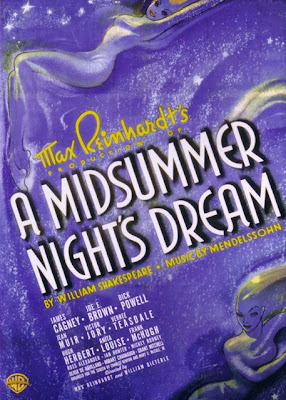A MIDSUMMER NIGHT'S DREAM (Warner Bros. 1935) Warner Home Video

For whatever reason, Shakespeare on film has always
remained a very tough nut to crack. Given the Bard’s eternal themes and eloquence
as the premiere dramatist, not only in his, but of all time, Will’s lack of
success in the movies remains a disconcerting mystery. Not that there have never
been great cinematic adaptations of his plays to consider. One immediately
conjures to mind, Joseph L. Mankiewicz’s Julius Caesar (1953), and,
Kenneth Branagh’s Hamlet (1996) – also, George Cukor’s 1936, and Franco
Zeffirelli’s ’68 versions of Romeo and Juliet. But what about a definitive
King Lear on the screen? Ditto for Twelfth Night, or, Macbeth?
In retrospect, it is generally conceded one of the artistic ironies about
William Shakespeare’s immortal works is that, although they endure as
captivating/escapist live theater, on celluloid something of that elusive spark
in performance gets lost. Perhaps,
Shakespeare’s greatest works do not require the camera trickery of the modern
age. Or, few directors working in the movies truly understand what makes Billy’s
diamond horseshoe of tragedies and rom/coms click as they should. Max
Reinhardt’s production of A Midsummer Night’s Dream (1935) is but one of
these latter-age unfortunates; a frightfully pretentious (in both talent and
temperament) adaptation of the bard’s merry chuckle and ode to young love.
Indeed, in planning this super-production, Warner
Brothers spared no expense on Shakespeare’s most ethereal grand dream. The
studio then, purveyors of ‘ripped from the headlines’ gangster/crime and
detective stories, knew little of the fantasy genre and even less about pulling off a period costume dramas. With varying degrees of success, and immediately
following the production code’s sanitizing of all screen entertainments, Warner
Bros. tried various experiments in an effort to change their public image. The
Busby Berkeley musicals were just one example. Reinhardt’s adaptation of A
Midsummer Night’s Dream was another. But on this occasion, the studio’s
assemblage of talent seems to have been blunted by too many big ideas thrown
haphazardly into one mesmerizing blend of super kitsch; interesting perhaps as
a series of vignettes, and spell-binding for its colossal waste of star power.
Plot wise: Theseus, the Duke of Athens (Ian Hunter) is
set to marry the Queen of the Amazons, Hippolyta (Verra Teasdale). At once, the
lowly Demetrius (Ross Alexander) is engaged to the flighty Hermia (Olivia
DeHavilland) who, in turn, shares none of his affections, but in fact, is heart
struck for the fairly foppish, Lysander (Dick Powell). In the meantime, Helena
(Jean Muir) is smitten with Demetrius. Enter the rather confrontational puppet
masters of the piece, Oberon – King of the Fairies (Victor Jory) and Titania
(Anita Louise), his queen. Oberon and Titania are split over the rearing of a
child currently in Titania’s care. But before the two can straighten out their
own marital discourse, they choose to re-examine the folly of these
aforementioned star-crossed couples – who have stolen into the night and are
now lost within the forested domain. The last bit of structural plotting
involves mischief maker, Puck (Mickey Rooney), a devilish prankster who
delights in sabotaging the course of true love to suit his own ticklish fancy.
Exploiting the rather hapless weaver, Bottom (James Cagney) and his own
misguided opinions on love and romance, Puck transforms man into ass –
literally - and thereafter sets about concocting a jealous love triangle with a
potion-drugged Titania. Naturally, Oberon will stand for none of it.
The chief problem with this Midsummer Night’s
Dream boils down to an utter lack of sparkle. The couples are just not
believable, and having them espouse Shakespeare’s golden-honeyed barbs and
badinage does not lighten their load. As example, we question Hermia’s clingy
devotion to the Lysander – primarily because Dick Powell in tights (whose lack
of understanding here is woefully on display) is hardly the epitome of manly
grace. Mickey Rooney’s Puck is a sort of bare-chested Peck’s Bad Boy meets the doomsayer
ramped up on a sugar fix – an unhappily obnoxious punster. Victor Jory’s Oberon
is Teutonic, though otherwise absent of the princely charm to compel us to buy
into his alliance with the bubbly Titania. Cagney’s Bottom is the best realized
of these star turns. He is, in fact, top-billed in the credits. Yet, even so,
he remains something of an arrogant misfire, valiantly going through the
motions with all the commitment of a consummate professional minus the
suspended disbelief to be entirely embraced or admired. In spite of every
effort made to will it into magnificence, A Midsummer Night’s Dream is
more of an awkward nightmare – a careworn junk sale of top-notch personalities,
utterly wasted.
There is nothing wasted in Warner Home Video’s
beautifully restored B&W DVD. The gray scale perfectly captures Hal Mohr’s
tenderly lit and gauze-filtered cinematography. The picture looks spectacular,
excellent contrast, and barely a hint of age-related wear and tear. Fine
details are remarkable, particularly in close-up, with only the occasional
establishing shot suffering from residual soft focus. There is no edge
enhancement or pixelization. The audio is Dolby Digital 1.0 mono and sounds
excellent for an audio of this vintage. Extras include a thorough commentary
from Scott McQueen, Olivia DeHavilland’s screen test, a vintage featurette,
short subjects and trailer. It is hard not to recommend this mastering effort,
even if the movie fails to hold up as an entertainment. In the end, A Midsummer
Night’s Dream remains an elegant experiment that proved itself an
interesting financial flop of mixed artistic virtues.
FILM RATING (out of 5 - 5 being the best)
3
VIDEO/AUDIO
4
EXTRAS
3


Comments